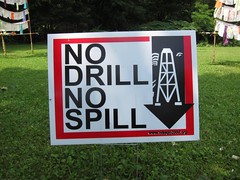While the New York State Department of Environmental Conservation has not yet approved regulations for horizontal “fracking,” and an executive order banning it until adequate health information is gathered is in place, some local governments are still making preparations to keep drilling out of town regardless of what the state permits.
On Thursday, March 21, a four-judge panel of the State of New York Supreme Court, Appellate Division, Third Judicial Department, comprising of Justice Elizabeth A. Garry, Justice Leslie E. Stein, Justice Edward O. Spain and Presiding Justice Karen K. Peters will hear arguments dealing with local governments’ ability to pass zoning regulation to ban the measure.
The controversial measure has also become a point of contention in the state Legislature, where competing plans dealing with the gas extraction operation, its health impacts and eventual regulation, are being vetted.
While pro-business advocacy groups, energy companies and some landowners claim the measure, which involves using sand and water to break open rock formations housing natural gas, can be done safely and for a profit, environmental advocates claim ground water contamination, pollution and serious health problems can be traced back to fracking operations in other states like Pennsylvania, where it is legal. Some claim the health impact will outweigh the economic gains.
Thomas S. West, founder and managing partner of the West Law Firm, which represents companies in the Town of Dryden and Town of Middlefield where local bans on fracking have been enacted, says he is confident rulings allowing the local bans to stand will be overturned. The rulings were based on what lower-court judges said were similarities between the Mined Land Reclamation Law, which has specific language protecting local government’s ability to “enact local zoning ordinance,” and other provisions of environmental law that deal with oil and gas.
Part of § 23-0303 of New York's Environmental Conservation Law reads: “the provisions of this article shall supersede all local laws or ordinances relating to the regulation of oil, gas and solution mining industries,” except with respect to local roads and real property tax law.
West said he expects the precedent set by the lower-level courts comparing oil and gas law to the Mined Land Reclamation Law will not stand.
Fighting local bans is just one of the issues that West says has come up as a result of the battle over fracking.
West says the four-and-a-half year moratorium has cost land owners and companies that would lease the land “billions of dollars.” He contends that additional delays could yield owners’ rights lawsuits.
West admonished New York for dragging its feet on coming up with appropriate health regulations and pointed to Ohio, a state that came up with fracking regulations in nine months and “never shut down” gas extraction operations, as a more efficient government. “There is good government and bad government. New York is an example of bad government,” West said.
Katherine Nadeau, the Water and Natural Resources Program Director with Environmental Advocate of New York had a contrary take on the state’s moratorium on horizontal drilling. She said the executive order needs to be strengthened by legislative action and made into law.
EANY members are advocating for a legislatively sanctioned moratorium on drilling until a set of acceptable regulations are adopted, she said, so the potential health impacts of fracking could be clarified.
She also said regulations for drilling proposed by the DEC do not appear adequate. “We looked at the proposal and [the proposed regulations] don’t go far enough to protect the public health and environment,” Nadeau said.
Article written by Dan Sabbatino.

Against fracking 01 (Photo credit: Bosc d'Anjou)







